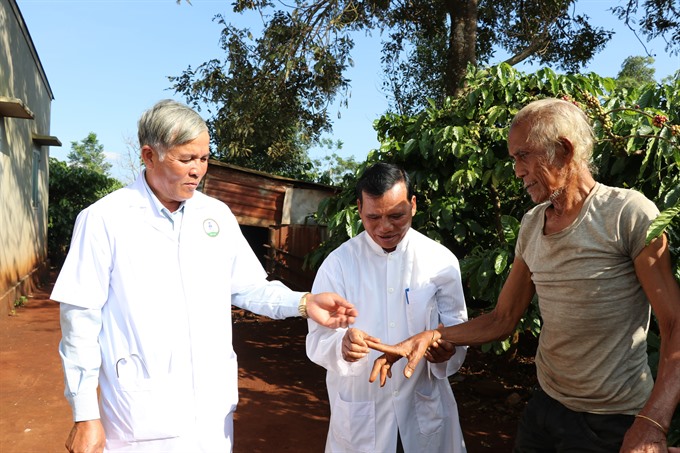 Society
Society

The Central Highlands Province of Gia Lai has deployed screening and surveillance programs in all the villages and households in the province to eradicate leprosy.
 |
| People with leprosy in Gia Lai Province receive unstinting support from authorities and medical workers. — VNA/VNS Photo Hồng Điệp |
GIA LAI— The Central Highlands Province of Gia Lai is screening every household as part of its efforts to eradicate leprosy.
Patients can now get medical treatment at home and are not isolated unlike in the past. They also are taught how to take care of themselves to ensure the disease does not spread to others.
Authorities support patients with a monthly allowance, clothes and regular examination by doctors.
They are also building separate water tanks and community cultural houses for people with leprosy, and providing them with cattle, seeds and seedlings and fertilizers to earn a living.
The implementation of a leprosy prevention programme in ethnic minority villages has helped raise people’s awareness of the disease. People are assured the disease cannot be transmitted easily because there are medicines to cure it.
Đinh Hok, 60, of Jri Village in Chư Sê District’s Bờ Ngoong Commune, who was deserted by her family after she contracted the disease, said thanks to authorities’ support and doctors’ care, patients no longer feel abandoned.
Jri Village used to have many residents, but after leprosy broke out most people moved out and now only a few dozen people live there, most of them are abandoned women.
According to Nguyễn Đức Bảy, deputy director of the Chư Sê District health centre, in 1980s and 1990s people with leprosy were stigmatised and isolated, sometimes in forests.
"But this no longer occurs," he said.
Đình Giác, 89, a patient in Chư Sê District’s Quái village, said he used to live away from his family and community, but after the province began the programme he had been cured and reunited with his family.
The district had 80 patients, 70 of them disabled at the beginning of this year. But thanks to the programme, there are now only 10 patients who are getting treatment and do not threaten to transmit the disease.
The district health centre co-ordinates with related agencies to carry out screening programmes to detect new cases and provide timely treatment. It has detected no new cases this year.
The province has a total of 700 patients, including 550 disabled ones.
This year five new cases have been detected.— VNS




